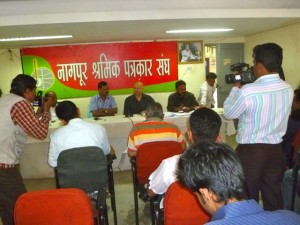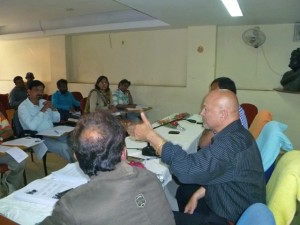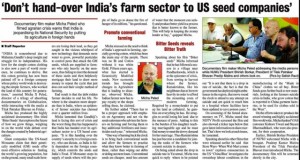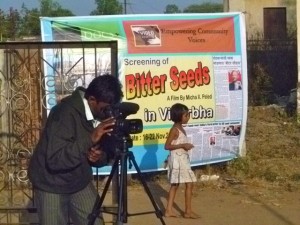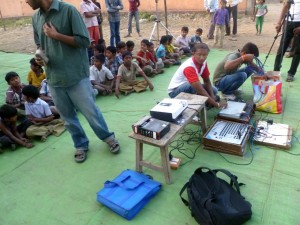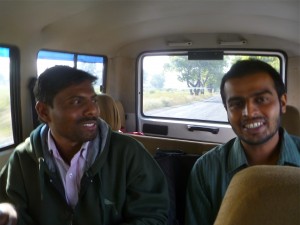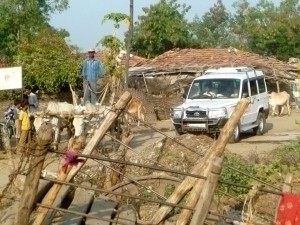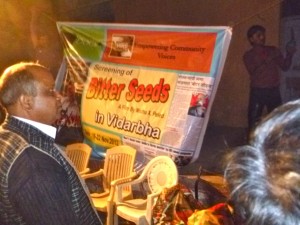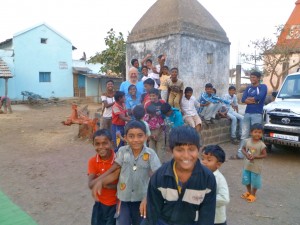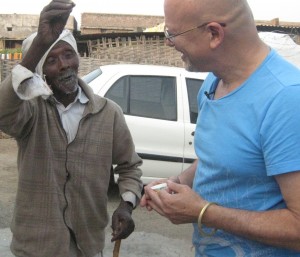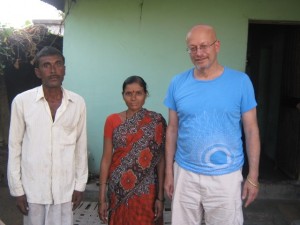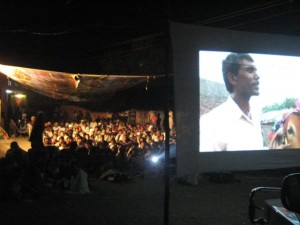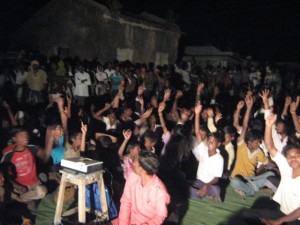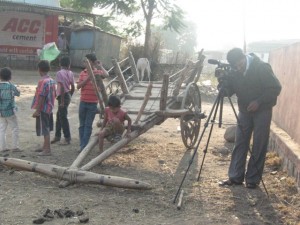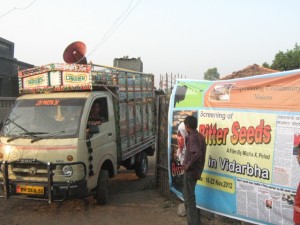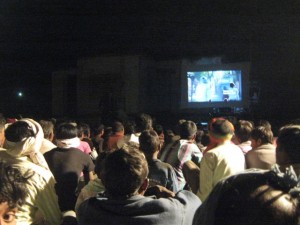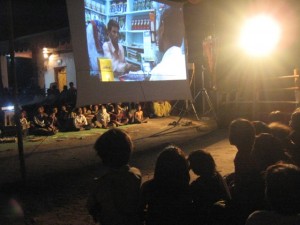Farmers’ Reactions to BITTER SEEDS: The Film Tours India’s Villages
By Micha X. Peled
Nov. 15, 2012, DAY 1: First, Get the Press
We kick off the Tour with a press conference in Nagpur, the regional capital of Vidarbha, the central India region where the film was shot. About 25 journalists and cameramen, all taking notes dutifully, though all would later misquote me.
One point I make which many of the reporters will cover is my note of alarm:
The disappearance of conventional seeds means India is losing its food sovereignty. “If tomorrow Monsanto decides to withhold its seeds from India, what will your farmers grow?” It’s a point Vandana Shiva has recently articulated eloquently in this article.
We’re partnering in the Film Tour with local farmers’ firebrand activist Kishor Tiwari.
Kishor notes that he’s been making the same point about food sovereignty but the journalists have ignored him. It takes an American visitor for the press to pay attention. The press indeed does, in three languages (English, Hindi, Marathi).
Sample of local Indian press coverage:
http://www.ehitavada.com/
Nov. 16, DAY 2: ‘The True Store of Our Life’
The tour is organized by Video Volunteers, an Indian NGO which has prior experience in setting up community screenings.
Two of their staff members are running the tour. Anand Pagare is the videographer. His English is very basic, so it’s a good thing that he needs no directions. Anand is always running around on the lookout for better angles and more meaningful footage. Siddharth Pillai coordinates everything else, from our transport to village activists. All I need to do is just show up, and handle the wily, yet indispensable Kishor.
The screenings are held outdoors, in front of each village’s main temple or council building, wherever there is a large patch of flat dirt. In the afternoon, the VV crew and local activists are busy setting up the projector and speakers, raising the screen, hanging our banner and rolling out a huge green carpet for the audience to sit on. Before dark farmers begin to return from the fields. Some of their bullock carts and small herds of cows pass by the temple. Some take a short cut, trampling through the “venue,” but no one seems to mind.
The audience ranges widely in age, from toddlers to grizzled elderly. Women and children sit apart from their men folk. Actually, they sit on the other side of the screen, watching the film flipped sideways. The sub-titles are reversed, but why read sub-titles when the film speaks the local Marathi? There is one row of plastic chairs, taken up by the village notables.
Our village premiere is not exactly a raging success. A cold front is currently enveloping the region (record low temps in the mid 50’s at night). Our audience arrives covered in thin blankets and scarves which fail to keep them warm and many leave in the middle. Only a few dozens are still there when the film ends and we start a discussion.
Personally, I’m gratified to hear that the speakers all affirm that the film is a true depiction of their lives. The Sarpanch – Village Council Head – thanks me with flowers for coming all the way from America to show them the film.
Screening location: Hiwra Basra
Audience size: 120
Memorable reactions:
• The film is the true story of our life.
• Bt (GMO) Cotton is truly creating great loss and harm.
• The market rates for cotton are so low. After I sold my harvest, I have only 2000 rupees ($40) left. How can I pay my loans? How can I live?
• The present is so bleak that I cannot imagine how bad the future will be.
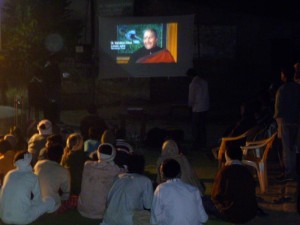
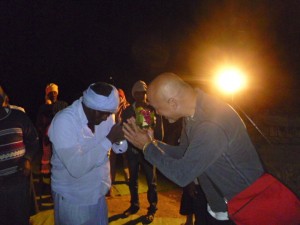
Nov. 17, DAY 3: ‘Farmers Must Unite’
We arrive earlier today, our jeep threading its way past cow herds and bullock carts. Tonight we start screening right after dark, and the large crowd stays all the way through.
Kishor’s role during the screenings is just as indispensable as during the discussions. Whenever the Monsanto spokesperson and seed company executives speak in English, the volume is lowered, Kishor grabs the mike and gives the Marathi translation. The industry critic, Vandana Shiva, also speak sin English in the film, and she is also translated. The parts in English contain the only new information to the villages, and I’m really curious to see how they take it in when a seed company director says that the farmers who commit suicide are usually the lazy ones.
Manjusha (the young woman in Bitter Seeds who want to be a journalist) and her mother have travelled on foot from their village (only 5 km away) to see the film. After the screening Manjusha grabs the mike and moves around asking people for their reactions. One young man read a poem he’s written during the screening, about the farmers’ misery. Manjsuha is accompanied by Sunanda, the wife of Ram Krishna, another major character in the film. Tonight it’s a happy reunion, but Sunanda’s early viewing is going to generate quite a surprise in a few days.
Screening location: Saikheda
Audience size: 210
Memorable reactions:
• I hope that all the farmers come together and struggle for their dignity and rights. Then, they cannot be ignored.
• the politicians they split the people into weaker, smaller factions which the authorities can afford to ignore.
• I am a farmer’s daughter. I see my father work hard all day, but he can barely make enough for us to get by.
Nov. 18, DAY 4: ‘I’d Rather Beg Than Farm Anymore’
I join Mohan, the local activist, walking from home to home to drum up attendance. Here you don’t have to knock on doors because there aren’t any, and almost everybody is outside anyway. Mohan hands out flyers about tonight’s screening. DIY film distribution. In addition, a van rolls slowly through the village dirt lanes with a loudspeaker announcing the evening’s entertainment. Anand sits on the van roof, capturing the promotional efforts on video.
In a short ceremony before the screening the local Sarpanch presents the documentary walla from America (me) with a Kashmiri shawl, a common local way here to bestow honor. We try a different post-screening approach tonight. Instead of just asking the villagers to react to the film, I first talk to them. Kishor is translating, and of course embellishing my story as he sees fit.
I tell them how I’ve shown the film all over the world, and how everywhere people connected the Vidarbha farmers’ crisis to their own farming issues. I also tell them that people want to know what the Indian farmers are doing to change their predicament. I’m shamelessly trying to provoke my audience. The reactions we’re getting are indeed more assertive this time. Some are even get funny.
Screening location: Shivani
Audience size: 150
Memorable reactions:
• After seeing this film, my eyes are opened. I don’t want to use Bt (GMO) cotton ever again. Bt must be banned. It must be boycotted. It must not enter the country. We must go back to conventional farming or else there is no future for farmers in this country.”
• I’d rather beg than farm anymore.
• Village doctor: Bt cotton is not just poisoning the land. It is poisoning the human body. The pesticides are causing joint pains. How can a weak, diseased person toil the fields?
• A farmer’s wife: To grow Bt cotton is like trying to grow hair on a bald man’s head.
Nov. 19, Day 5: ‘Bring Back Conventional Seeds’
The screening tonight is in front of a large village temple. Before starting I’m asked to go inside to the altar and garland the gods. I’m then greeted again with flowers and a printed plaque commemorating my visit. The ceremonies are becoming more elaborate each day.
The crowd tonight also includes people from a neighboring village. The audience is spilling out of the temple yard into the road, completely blocking it. Any art house in America would love an audience this size, even for their box office hits.
The film doesn’t get beyond the opening scenes before it is interrupted. It’s 6:30, time for puja (a traditional prayer), accompanied by loudly-ringing bells. We start again. People are audibly responding to scenes in the film. There are knowing chuckles all around at the scene of Manjusha discovering that the seed company brochures were lying, that the phone numbers they listed of satisfied farmers are all phony. There is heightened alertness when Ram Krishna finds out what price his harvest fetches.
Screening location: Daheli Tanda
Audience size: 180
Memorable reactions:
• local leader: The government has taken away our voices. It has silenced the people. Now we do not even know how to voice our own issues and problems… It is high time that the farmers of Vidarbha unite and start their own revolution.
• Villager with a diploma in agriculture: I have seen both kinds of farming – the natural, ecological farming that we used to do in this village and the synthetic farming that we switched to. Ecological farming was cheaper, we used manure for fertilizer. Costs were low, yields high and there was a profit.”
• We need to go back to the practices and wisdom of our fathers. I want to use conventional seeds, not BT. I want to prepare pesticides by grinding leaves of the neem tree. Just like my father did.
• How can we get conventional cotton seeds? The big companies put pressure to keep them out.
Nov. 20, DAY 6: Nasty, Yet Ironic Twist
At midday, I do another press conference, this time in the town of Yavatmal, for the local press. Unlike in the U.S., in India the print press is still vigorous, and actually growing in circulation and profits. Even in this remote rural district, there are some 20 journalists attending. One of them suggests that I may have been hired by Monsanto’s competition, companies that are trying to discredit the seed multinational. Hard to tell if he’s just trying to provoke me. He turns out to be the local stringer for The Times of India, the world’s largest daily in English (over 4 mil. cir.).
Tonight’s screening is special, as it takes place in Telung Takli, the village where I shot the film. There couldn’t be a more literal closing of a circle than coming here to screen Bitter Seeds. We quickly find all the major characters in the film, and they all seem quite happy to see me.
I sit down with Ram Krishna and his wife, Sunanda to find out how they are doing. Ram Krishna looks like he’s been knocked about by life quite a bit since I last saw him. He appears fragile, helpless and barely able to stand straight. I brought them donations from a few viewers, but first I ask about their financial situation. They tell me they still have a large debt from their daughter Sawpna’s wedding, along with new farming obligations. Their second daughter, Swati, dropped out of high school during the 12th grade, so there is no point in allocating any funding for her continued education. They say their first priority is to pay the bank loan, and we agree that the donation I brought will go toward that purpose. The amount I give them is equal to half-a-year of the family’s subsistence cost, but still, when we take photos we have to ask Ram Krishna to smile.
Manjusha and her mother are as hospitable as ever, bringing out food and chai for everyone. I also track down Keshav, the old man whose photo has been used most often by film festivals around the world to represent Bitter Seeds.
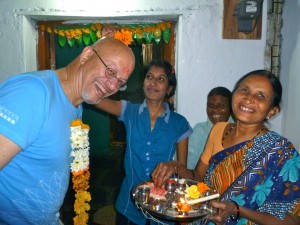
But then we’re told that Sawpna’s husband demands that the film will not be shown. Apparently, his family is embarrassed by two scenes in the film. When Sunanda joins the request to avoid offending her in-laws, I agree to fast-forward those two scenes. It’s the first time ever that I accepted any form of censorship over any of my films. But the son-in-law is still not satisfied. He threatens to send his wife and baby back to her parents if the film is shown. The Village Head, Ravi, shuttles back-and-forth while a huge crowd is waiting patiently for the film to start.
We are at an impasse. I find it hard to believe that the man will break up his family that easily, but to my surprise even Kishor is hesitating. To gain time, he suggests that we start with the ceremony that precedes the screening. I decide to pretend we have no problem, and tell them what it means to me to be able to come back to Telung Takli with the completed film. Someone presents me with a coconut and I remind the crowd that on the first day of filming they also brought a coconut, which we opened in front of the camera, according to local traditions. Kishor says many filmmakers and photographers came to Vidarbha, but I’m the first to return to show my work to the villagers. He presents me with an award. Then, he turns to the audience and asks, Who would like to see the film now? Almost every hand comes up.
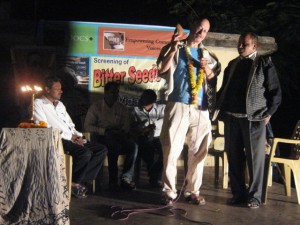
With this widespread public support, the screening starts. But a few minutes into the film, the first time Sunanda appears, the film is fast-forwarded. I rush over and demand an explanation. When I reach to grab the remote control to make sure this doesn’t happen again (except for the two scenes we’ve agreed not to show), the projector cable is accidently pulled out. The pin is stuck inside and the screening is brought to a halt. All we can do is promise the audience that tomorrow evening transportation will be provided to take people to the next screening in a village nearby.
I’m worried about Sawpna, Ram Krishna’s daughter, that her bullying husband might hurt her. Ravi, the Sarpanch tells me not to worry – he intends to spend the night sleeping in their house to prevent any outbreak of domestic violence.
Screening location: Telung Takli
Audience size: 160
Nov. 21, DAY 7: ‘The Story of Famers Everywhere’
Yesterday’s press conference is aired on a local t channel, which we happen to catch at the hotel. It’s slow going, as I had to pause after each phrase for the interpreter, but they are running the whole thing. But it’s my last day, and I have to start the long drive back to Nagpur airport, to catch a flight out to Mumbai.
In the evening, the VideoVolunteers crew shows the film without me. A couple of vehicles bring people from Telung Takli to see the film.
Screening location: Maregaon
Audience size: 180
Memorable reactions:
• Village Head: What was shown in today’s movie are true facts about our lives… The company keeps inflating the prices of the seeds. The farmers don’t have any option. There is no other seed in the market… We farm many acres, but the yield is limited to a few quintals… At the market we are forced to sell the cotton at low rates. We cannot even hope to recover the basic cost of the farming, let alone pay back the loans. Hardly anyone gets a loan from a bank. We can only borrow from a private moneylender at high interest.
• This is not the only side-effect of Bt (GMO) farming. My brother and I lost 6 cows which ate the plants after we harvested. They all died poisoning.
• A Telung Takli resident: This is not just the story of Telung Takli but farmers everywhere.
• A young woman with two babies: My husband committed suicide because of the loss we suffered on the farm… The costs kept rising. We had to borrow more and more money… The harvest was poor. The moneylenders were knocking on our doors. My husband succumbed to the pressure… I always think that if it were not for farming, my husband would still be alive. I live alone now. I stitch clothes to make a living. I am never going to farm again.

